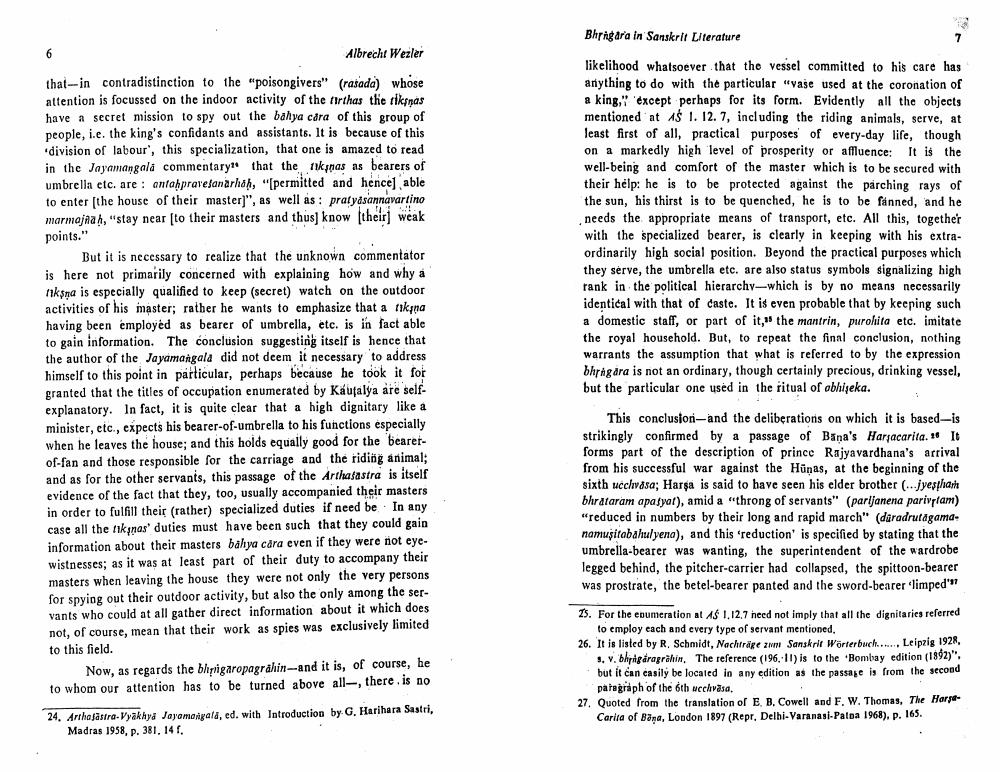Book Title: Bhrngara In Sanskrit Literature Author(s): A Wezler Publisher: A Wezler View full book textPage 4
________________ 6 Albrecht Wezler that in contradistinction to the "poisongivers" (rasada) whose attention is focussed on the indoor activity of the tirthas the riksnas have a secret mission to spy out the bahya cara of this group of people, i.e. the king's confidants and assistants. It is because of this 'division of labour', this specialization, that one is amazed to read in the Jayamangala commentary that the kipas as bearers of umbrella etc. are: antaḥpravesanarhah, "[permitted and hence] able to enter [the house of their master]", as well as: pratyasannavartino marmajñaḥ, "stay near [to their masters and thus] know [their] weak points." But it is necessary to realize that the unknown commentator is here not primarily concerned with explaining how and why a niksna is especially qualified to keep (secret) watch on the outdoor activities of his master; rather he wants to emphasize that a tikina having been employed as bearer of umbrella, etc. is in fact able to gain information. The conclusion suggesting itself is hence that the author of the Jayamangala did not deem it necessary to address himself to this point in particular, perhaps because he took it for granted that the titles of occupation enumerated by Kautalya are selfexplanatory. In fact, it is quite clear that a high dignitary like a minister, etc., expects his bearer-of-umbrella to his functions especially when he leaves the house; and this holds equally good for the bearerof-fan and those responsible for the carriage and the riding animal; and as for the other servants, this passage of the Arthatastra is itself evidence of the fact that they, too, usually accompanied their masters. in order to fulfill their (rather) specialized duties if need be. In any case all the tikinas' duties must have been such that they could gain information about their masters bahya căra even if they were not eyewistnesses; as it was at least part of their duty to accompany their masters when leaving the house they were not only the very persons for spying out their outdoor activity, but also the only among the servants who could at all gather direct information about it which does not, of course, mean that their work as spies was exclusively limited to this field. Now, as regards the bhrigaropagrahin-and it is, of course, he to whom our attention has to be turned above all, there is no 24. Arthasastra-Vyakhya Jayamangala, ed. with Introduction by G. Harihara Sastri, Madras 1958, p. 381, 14 f. Bhrigara in Sanskrit Literature likelihood whatsoever that the vessel committed to his care has anything to do with the particular "vase used at the coronation of a king, except perhaps for its form. Evidently all the objects mentioned at 4S 1. 12. 7, including the riding animals, serve, at least first of all, practical purposes of every-day life, though on a markedly high level of prosperity or affluence: It is the well-being and comfort of the master which is to be secured with their help: he is to be protected against the parching rays of the sun, his thirst is to be quenched, he is to be fanned, and he needs the appropriate means of transport, etc. All this, together with the specialized bearer, is clearly in keeping with his extraordinarily high social position. Beyond the practical purposes which they serve, the umbrella etc. are also status symbols signalizing high rank in the political hierarchy-which is by no means necessarily identical with that of caste. It is even probable that by keeping such a domestic staff, or part of it, the mantrin, purohita etc. imitate the royal household. But, to repeat the final conclusion, nothing warrants the assumption that what is referred to by the expression bhragara is not an ordinary, though certainly precious, drinking vessel, but the particular one used in the ritual of obhişeka. This conclusion-and the deliberations on which it is based-is strikingly confirmed by a passage of Bana's Harjacarita. 20 It forms part of the description of prince Rajyavardhana's arrival from his successful war against the Hūnas, at the beginning of the sixth ucchvása; Harsa is said to have seen his elder brother (...jyestham bhrataram apatyat), amid a "throng of servants" (parljanena parivrtam) "reduced in numbers by their long and rapid march" (daradrutagamanamusitabahulyena), and this 'reduction' is specified by stating that the umbrella-bearer was wanting, the superintendent of the wardrobe legged behind, the pitcher-carrier had collapsed, the spittoon-bearer was prostrate, the betel-bearer panted and the sword-bearer 'limped'" 25. For the enumeration at A$ 1,12.7 need not imply that all the dignitaries referred to employ each and every type of servant mentioned. 26. It is listed by R. Schmidt, Nachträge zum Sanskrit Wörterbuch...... Leipzig 1928, s. v. bhrigaragrahin. The reference (196,11) is to the Bombay edition (1992)". but it can easily be located in any edition as the passage is from the second paragraph of the 6th ucchvāsa. 27. Quoted from the translation of E. B. Cowell and F. W. Thomas, The HarsaCarita of Bana, London 1897 (Repr, Delhi-Varanasi-Patna 1968), p. 165.Page Navigation
1 2 3 4 5 6 7 8 9 10 11 12 13 14 15 16 17 18 19 20 21 22 23
